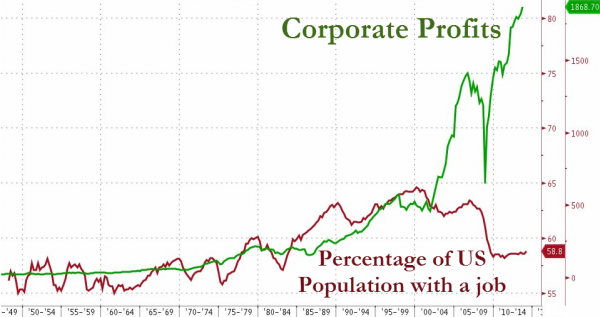You hear that old saw that “the market is not the economy,” a lot these days, and for good reason. As ConvergEx’s Nick Colas notes, the S&P 500 breaks to record highs – but U.S. labor markets remain sluggish; investor portfolios do well – but over 47 million Americans (more than 15% of the population) are still in U.S. food stamp program – the same as August 2012. The important question now is: “Is the market TOO different from the economy?”

Record corporate profits – the reason for all-time highs in U.S. equities – come with little hiring or wage gains. The hottest growth stories are business models with lots of customers but very few employees. The recently purchased WhatsApp – for $19 billion – has 55 employees. Investment payoffs – and increasingly social outcomes as well – are technology-enabled, asymmetric and sporadic. How soon before we reach a tipping point?
Via ConvergEx’s Nick Colas,
Â
Last week the local government of San Francisco announced that Google has promised to give $6.8 million over the next two year to pay for over 31,000 low-income young people to use the city’s mass transit system for free.  Mayor Edwin Lee applauded the company for helping ease San Francisco’s “Affordability crisis for lower and middle-income familiesâ€. Without Google’s help, the successful pilot program would have run out of money in July of this year.
Â
Google’s initiative seems to be a direct response to numerous local protests over its practice of providing free shuttle busses throughout the city for the sole benefit of its employees.  Local and often long-time residents, fed up with cost of living inflation from their new stock-option enriched neighbors, see the busses as a symbol of an out-of-touch elite and the companies they serve. Some of the protests have turned violent. Even Wired magazine, a widely read voice of the merits of technology, sees the problem. In the most recent issue: an editorial entitled “Breaking Point: Silicon Valley Can’t Avoid the Hatersâ€, and a back page questionnaire – “Am I a Silicon Valley Douchbag?â€
Â
There’s an old Wall Street aphorism that goes “The market is not the economyâ€, something akin to “A Google bus is not the San Francisco economy.â€Â In both cases, you’d think there were would some correlation. A hugely profitable Silicon Valley should mean a broadly wealthy and generally content “City by the Bayâ€. And a rocking stock market should indicate a U.S. economy solidly on the mend after the Financial Crisis and accelerating in 2014. Neither seems to be true.
Â
That old school maxim about the market and the economy used to be accurate for the following reasons:

